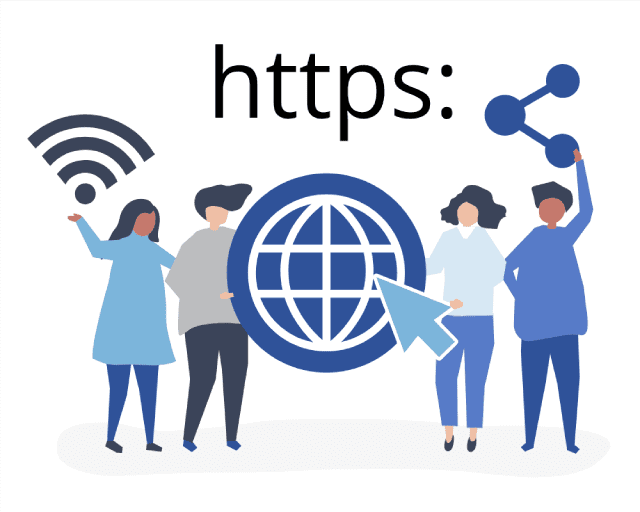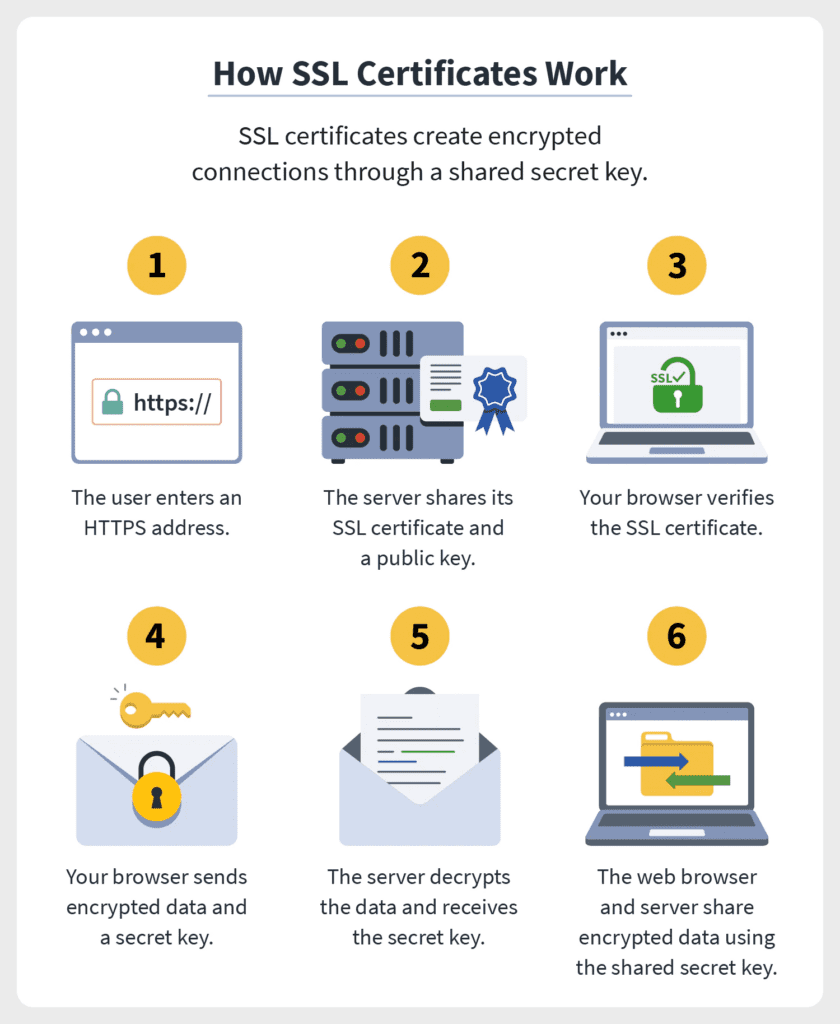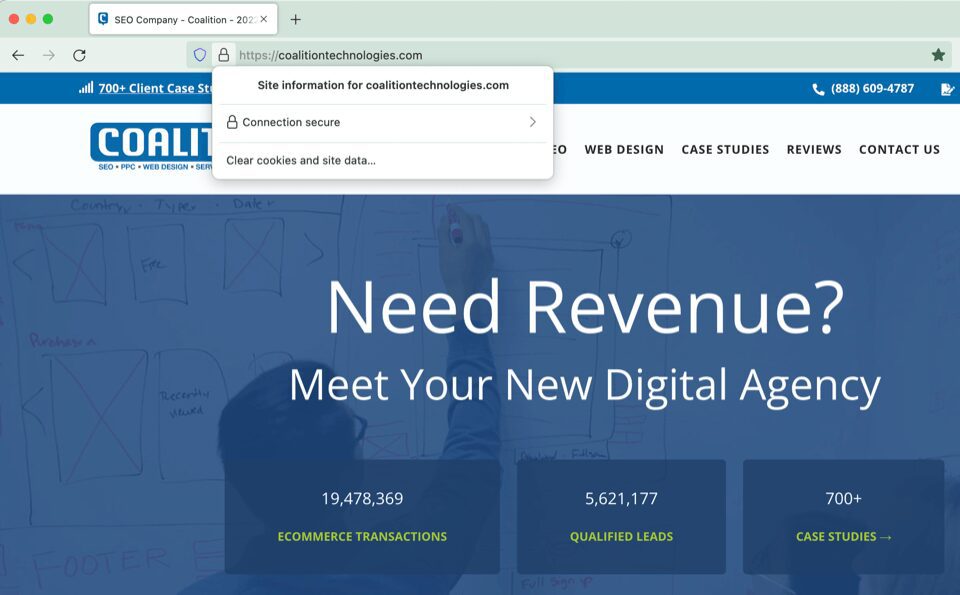
Designing and launching a website is an involved and complex process. While it can be easy to focus on the aesthetics of web design, there are many technical requirements lying beneath the surface that you need to address. After all, the user experience encompasses so much more than just the look and feel of your website. Users need to browse securely—both for the safety of their personal information and the reputation of your business.
A critical security element is the SSL certificate. But what exactly are SSL certificates for websites, and how do you determine if SSL for your website is something that you need? If SSL has recently come onto your radar as you’ve started creating your own website, planning a blog, or launching an online business, you’ll benefit from a closer look at SSL certificates and how they support you, your users, and your SEO strategy.
Table of Contents
What Is an SSL Certificate?
A secure socket layer (SSL) certificate plays a primary role in securing your website. In layman’s terms, an SSL certificate encrypts information to secure it as it is transmitted over the internet to and from your computer. Think of it as a lock on your suitcase as it goes through baggage checks at the airport. This lock ensures that the data customers and visitors share with you is secure, providing them with a more confident browsing experience.
While SSL for a website might seem like a foreign or highly technical topic, the reality is that most internet users are already familiar with SSL certificates—even if they don’t know it yet. You can tell when a website has an SSL certificate by looking for HTTPS in the web address instead of HTTP. The certificate also displays a lock next to the URL, which may appear gray or green. With an SSL certificate, your customers will feel safer supplying you with their personal and financial information.

How Does an SSL Certificate Work?
Understanding how SSL certificates for websites function is simpler than it seems. When a website or server connects to a website with an SSL certificate, the browser checks the SSL certificate to ensure that it’s trustworthy, starts an encrypted session, and begins sharing encrypted data between the browser and the webserver.
SSL certificates for websites are also transparent for users. If you click on the lock located in the web address bar, you can see the status of the connection, cookies, and further information about the SSL certificate itself. This allows users to learn more about the SSL certificates behind certain websites.

SSL certificates break down into the following types:
Domain Validation (DV) Certificates
A DV certificate only serves to verify who owns the site, and these certificates offer the lowest level of trust and security. In fact, 94% of identified phishing sites used Domain Validated (DV) SSL in 2021, suggesting that DV certificates often give an illusion of trust. Visitors concerned about the type of SSL for your website may look for stronger validation of your credentials.
Organization Validated (OV) Certificates
While OV SSL certificates for websites add an additional layer of trust by authenticating the owner of a domain. To obtain an OV certificate, you’ll need to submit verifying documents. While this might be more tedious , but your SSL certificate will offer better security and create more trust for your online business.
Extended Validation (EV) Certificates
EV certificates offer the strongest SSL for websites. Although these certificates take longer to obtain—usually several days—they provide the highest degree of consumer trust for websites that handle sensitive information. Customers will trust that your site has been independently verified and will feel more confident making online purchases.
Why Are SSL Certificates So Important?

Security is one of the most important features of any website. If your website is not encrypted, no amount of stunning graphics will prevent you from being hacked. As more customers are aware of the importance of secure HTTP, not displaying SSL certificates for your website will almost certainly cost you business.
There are several reasons why SSL certificates are important to your overall web design. These include:
- Secured, Encrypted Data: SSL certificates encrypt and protect customer data—including payment information, name, and address—and protect your website against malicious third parties. Considering both consumer optics and the practicality of safeguarding data, security is the primary reason to obtain SSL for your website.
- Ensures Compliance: Protecting the data of your customers is important, but in many cases, it’s also a requirement for the type of business you operate. The Payment Card Industry Data Security Standard (PCI DSS) requires an SSL certificate if you’re handling payment information. As new laws and regulations emerge in the future about protecting consumer data, already having an SSL certificate for your website will keep you ahead of the curve.
- Authenticates Your Website: Phishing scams abound, and SSL certificates can help authenticate your site so that users don’t bounce, thinking they may have stumbled onto an imitation or scam site. Opt for an SSL certificate that provides the highest level of trust and security. Educate your customers on how to authenticate your site, too. As it is with all elements of business, transparency will inspire confidence and let your customers know that you’re taking all of the necessary steps to protect them.
- Developing Trust With Customers: Think of your own experience as a customer knowing what you know about SSL for websites. If you were to see a website without a lock symbol next to the URL or one that didn’t offer any more information about the SSL certificate, would you continue to use that website? Of course not! This is why SSL is so important when it comes to your relationship with prospective customers. SSL certificates for websites help you foster trust with customers. One study estimates that 61 percent of customers would refuse to shop on an e-commerce site, while another study estimates that around 84 percent of users would abandon their purchase if an SSL certificate was not present. In today’s world where there’s no shortage of malware or scams going around, it’s important to develop a strong relationship with customers where they know they’re in good hands.
- Improved SEO: When the topic of SSL for websites comes up, the conversation generally centers around website security. However, you’ll find that SSL doesn’t just impact security or how customers approach your website. SSL certificates play a role in SEO rankings as well. Google’s own Gary Illyes has said that SSL certificates can be a tiebreaker between websites with otherwise similar SEO strategies, and one study revealed a 7 percent increase in website ranking and improved page visibility when they installed an SSL certificate. Put simply, if you and a similar website have a similar SEO strategy and you’re both battling for the same position on SERPs, having an SSL certificate can be just what you need to rise above those who aren’t successfully protecting their website.
SSL certificates for websites are critical to security, customer relationships, and even SEO. With SSL for your website, you can guarantee that your website has the necessary protection and support that both you and your customers demand while also taking advantage of the other benefits listed above.
So, Do You Need One for Your Website?
The answer might seem obvious, but some might read more about SSL only to believe that the process might be too difficult or that they don’t need it and skip it altogether. In fact, the push for SSL on websites is relatively new. As recently as 2016, 79 out of 100 top sites didn’t use SSL certificates by default.
As more consumers become aware of digital security best practices, it’s important to stay current. Avoid relying on outdated advice, and instead be proactive to protect your website.
Need Help With Your Web Design and SSL Certificates? Coalition Technologies Can Help!
No matter what type of business you operate, the reality is that an SSL certificate is a must. This minor certificate can have an impact on your SEO strategy, your website security, and the relationship that you have with your customers. That being said, SSL for your website can be a confusing topic, and securing SSL certificates for websites might be as well. The good news? Coalition Technologies is here to help!
Coalition Technologies is the top SEO and web design agency in the market. We’re committed to providing you with the best possible support backed by years of expertise and success working with businesses like yours. Whether you need help solely with the SSL for your website or you’re trying to create a better overall user experience, we’re here to provide you with the level of care and results that your business deserves. Contact us today so that we can learn more about your business’ needs and how we can grow with you by calling us at (310) 827-3890 or emailing us at [email protected].


